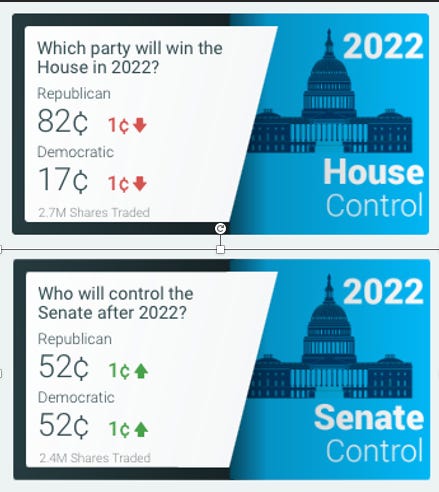EXTRA! EXTRA! STRIKE?
A US railroad strike threatens to upend an already fragile economy
SUBSCRIBE HERE
Key Details
That railroad strike the Biden Administration averted in September apparently didn’t stay averted. The third largest railway union, the Brotherhood of Maintenance of Way Employees (BMWE), voted down the agreement brokered by the Administration by 56%[i]. The two biggest unions, which together make up half of the 115,000 union workers on the US Class 1 freight railroads, began voting by mail October 15th and return ballots by November 17th, nine days after the November 8th midterm elections. In total, there are twelve railway unions collectively renegotiating their contracts, but provisions in their contracts ensure equal terms and a strike by one would be a strike by all.
A strike is not certain with the BMWE hoping to return to the bargaining table and strike no earlier than November 19th. The key contractual issues in dispute are related to sick leave, not wages. Not all US Class 1 freight railroad workers are unionized, so in the event of a strike railroads would continue to operate, but at reduced capacity.
How Did We Get Here?
Railway workers are governed by unique labor law that allows for more government intervention to prevent a strike. After three years of failed negotiations between railroad management and unions, railroad unions voted to strike in July. President Biden intervened to prevent a strike, initiating a 60-day cooling off period, and appointed a Presidential Emergency Board (PEB) to mediate negotiations between railway management and the unions. Then in mid-September, hours before the deadline, the PEB announced agreement on a contract after 20-hour overnight negotiations. Secretary of Labor Marty Walsh said, “It’s like, Holy Christ: The magnitude of what would have happened,” Walsh, running on an hour-and-a-half of sleep, said in an interview. “We’ll never fully understand, thank God.”[ii] The PEB contract was just rejected by workers.
Impact on US Economy
A strike would cause further supply-chain issues, inflation, and higher gas prices. The impact on the US economy would bring 40% of the nation’s freight traffic to a halt and cost $2 billion a day[iii]. The US economy is $23 trillion per year so $2 billion is 3% per day. More importantly, a strike would be in late November and could ruin Christmas.
A strike would certainly cause further supply-chain issues. But unlike a delay to the delivery of your Peloton bike, freight railroads carry things like food and oil that are critical to the functioning of a modern economy. Presumably, railroads would prioritize critical shipments but sorting that out would take time and a mess would be guaranteed.
Figure 1: Tank cars carrying petroleum products
Political Analysis
For the purpose of this article, we are going to assume good faith on behalf of the Biden Administration’s negotiation with railroad unions and management, but a more cynical observer may argue that conducting ratification votes after the US midterm elections was a deliberate political ploy.
From the union’s perspective, this action makes perfect sense. There is currently a labor shortage in the US, giving labor the upper hand against their archnemesis management (as evidenced by the large number of work stoppages going on across the country). This issue has its roots in demographic issues, discussed here. Americans also have a historically favorable view of unions right now, with 71% approving. There is currently a trucking shortage, so the backup source of freight transportation is unavailable. All these factors combined amount to labor having massive leverage over railroad management and politicians.
A level up in Washington D.C., interesting dynamics exist between Democrats and Republicans. Congressional action can break a strike, but doing so would alienate workers everywhere. Democrats have historically been allies with unions and the Republicans have been cozy with management, but that’s in flux right now. Both parties are going after workers. A potential strike would occur after the midterm elections, probably in the lame-duck period before a new Congress is sworn-in in January 2023. Republicans are strong favorites to take the House. The Senate is currently a toss-up.
Figure 2: PredictIt betting market for US midterm elections (10/16/2022)
So lawmakers face the very real possibility of Democrats losing control of Congress and then having to address this strike in the lame-duck session. For Democrats, who have slim majorities in the House and Senate currently, action to break the strike would alienate a constituency already at risk of being lost to Republicans. Inaction would mean an economic catastrophe. For Republicans, who are out of power, the ball is in the Democrats court. It’s hard to see them doing anything. Either the Democrats break the strike and drive workers into Republican arms or the economy crashes and both parties blame each other. A wildcard is Independent Senator Bernie Sanders of Vermont, who caucuses with the Democrats and previously expressed solidarity with the labor unions[iv]. The Democrats would need his vote to pass anything along party lines in the current 50-50 Senate.
I don’t have a prediction but the situation is historically significant.
Overview of US Freight Railroad System
The US rail network is 138,851 miles long and carries 12.2 billion tons of goods per year[v]. It’s designed to transport goods to and from ports on the coasts to and from anywhere in the US. It transports crops from the Midwest (the largest, most productive piece of contiguous agricultural land in the world) to densely populated coastal areas in the US and for export to the world. Trains transport oil and refined products, especially when there is no pipeline infrastructure (such as out of the Bakken shale oil play in North Dakota and from Canada).
Figure 3: US freight railway network
Regardless of what happens, we’re all aboard this train wreck.
SUBSCRIBE HERE (FREE)
[i] https://labornotes.org/2022/10/we-are-not-done-yet-railroad-track-workers-reject-deal
[ii] https://www.politico.com/news/2022/09/15/rail-strike-unions-labor-deal-00056997
[iii] https://www.politico.com/news/2022/10/11/railroad-workers-rejection-contracts-strike-00061285
[iv] https://labornotes.org/2022/09/joe-biden-thinks-rail-strike-has-been-averted-do-rail-workers
[v] Department of Transportation, Bureau of Transportation Statistics







![US Freight Rail Network [800x524] : MapPorn US Freight Rail Network [800x524] : MapPorn](https://substackcdn.com/image/fetch/$s_!k1bd!,w_1456,c_limit,f_auto,q_auto:good,fl_progressive:steep/https%3A%2F%2Fbucketeer-e05bbc84-baa3-437e-9518-adb32be77984.s3.amazonaws.com%2Fpublic%2Fimages%2F939a6c46-32d9-4a51-b37a-9c6aa411df46_800x524.jpeg)
